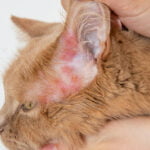Table of Contents
Fleas are a common nuisance for cats and their owners. While conventional flea treatments can be effective, they often contain harsh chemicals. Fortunately, there are natural alternatives that are both safe and effective. In this article, we explore 10 natural flea treatments for cats that will help keep your feline friend healthy and flea-free.

Regular Combing with a Flea Comb
One of the simplest and most effective natural flea treatments for cats is regular combing with a fine-toothed flea comb. This helps remove adult fleas, larvae, and eggs from your cat’s fur. Focus on areas where fleas are most likely to hide, such as the neck, base of the tail, and under the legs. For more information, visit ASPCA Flea Care.
Use Diatomaceous Earth
Diatomaceous earth (DE) is a natural powder made from fossilized algae. It works by dehydrating fleas, effectively killing them. Use food-grade DE and lightly dust it on your cat’s fur, bedding, and around your home. Ensure your cat does not inhale the powder. For more on using DE, see PetMD Diatomaceous Earth.
Apple Cider Vinegar Spray
Apple cider vinegar (ACV) can be used as a flea repellent. Mix equal parts ACV and water in a spray bottle and lightly mist your cat’s fur, avoiding the face. ACV makes the environment less hospitable for fleas. For additional tips, visit The Spruce Pets.
Essential Oils
Certain essential oils, such as lavender, cedarwood, and neem, have flea-repellent properties. Dilute a few drops of essential oil in a carrier oil (like coconut oil) and apply it to your cat’s fur. Always consult your veterinarian before using essential oils, as some can be toxic to cats. For more information, visit Cornell Feline Health Center.
Bathing with Natural Flea Shampoo
Bathing your cat with a natural flea shampoo can help remove fleas and soothe irritated skin. Look for shampoos with natural ingredients such as aloe, eucalyptus, and oatmeal. Bathe your cat as needed, and always follow the product’s instructions. For tips on bathing your cat, see PetSmart.
Herbal Flea Collars
Herbal flea collars infused with natural oils such as citronella, eucalyptus, and lavender can repel fleas. These collars are a chemical-free alternative to conventional flea collars. Replace the collar every few months for continued protection. For more on herbal flea collars, visit Chewy.
Vacuuming and Cleaning
Regular vacuuming and cleaning are essential parts of a natural flea control regimen. Vacuum carpets, furniture, and your cat’s bedding frequently to remove fleas and eggs. Wash your cat’s bedding in hot water weekly. For a comprehensive guide on cleaning for flea control, visit The Spruce Pets.
Lemon Spray
Lemons contain a natural flea-repellent compound called d-limonene. To make a lemon spray, boil sliced lemons in water, let it steep overnight, and then strain the liquid into a spray bottle. Lightly mist your cat’s fur with the lemon water, avoiding the face. For more on homemade flea sprays, see AKC Homemade Flea Spray.
Use a Flea Trap
Flea traps can help reduce flea populations in your home. These traps attract fleas with light and heat, then capture them on sticky pads. Place traps in areas where your cat spends the most time. For more on flea traps, visit PetSmart Flea Traps.
Maintain a Healthy Diet
A healthy diet can boost your cat’s immune system and make them less susceptible to fleas. Include high-quality proteins, essential fatty acids, and vitamins in their diet. For more on feline nutrition, visit ASPCA Cat Nutrition Tips.
Conclusion
Using natural flea treatments for cats can be an effective and safe way to keep your feline friend flea-free. Regular grooming, natural repellents, and maintaining a clean environment are key strategies. Always consult your veterinarian before trying new treatments to ensure they are safe for your pet. For more tips on natural pet care, check out our Natural Pet Care Guide.
FAQs on Natural Flea Treatments for Cats
Are essential oils safe for cats?
Some essential oils can be toxic to cats. Always dilute essential oils and consult your veterinarian before use.
How often should I bathe my cat with natural flea shampoo?
Bathe your cat as needed, typically once every few weeks. Follow the shampoo’s instructions for best results.
Can diatomaceous earth harm my cat?
Use food-grade diatomaceous earth and avoid letting your cat inhale the powder. Apply it lightly to your cat’s fur and surroundings.
How do I make a lemon spray for fleas?
Boil sliced lemons in water, let it steep overnight, strain the liquid, and pour it into a spray bottle. Lightly mist your cat’s fur, avoiding the face.
How can I boost my cat’s immune system to prevent fleas?
Provide a balanced diet with high-quality proteins, essential fatty acids, and vitamins. Consult your vet for specific dietary recommendations.
What should I do if my cat has a severe flea infestation?
Consult your veterinarian for advice. They may recommend a combination of natural treatments and conventional flea control methods to effectively manage the infestation.











